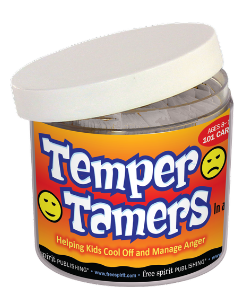Work on strategies for dealing with anger
In the jar: 101 cards
Ages 8+
An activity to teach kids how to calm down and deal with anger in healthy ways. The ages on the jar are 8-11, but I wouldn't put an upper age limit on it because I use it successfully with much older kids too. The jar contains 101 cards, each printed with an activity that falls into one of four categories:
- Share - Questions are posed and players are asked to relate a personal experience.
- Tips - Positive strategies you can use when you get angry.
- What would you do - Hypothetical situations to get kids thinking and promote thoughtful discussion.
- Act it out - Scenarios are given and players have the opportunity to role play or instructions are given so players can practice strategies.
Many of the examples on the cards are related to things happening at school, or between siblings, or between parents and kids. There is an actual example of each card at the publisher's website. To see them, click here or go to FreeSpiritPublishing.com.
Try this:
- Shuffle the cards, mixing the categories and go through the stack one at a time. Or, divide the cards into the four categories and take one category at a time.
- Go through the TIPS category first. Then as you go through the other three categories, review the strategies you learned from the tips cards and choose all that would be appropriate for each particular situation.
- Role play with each individual to ensure they are applying appropriate strategies. Or, allow two players to role play and then discuss whether the responses were appropriate and healthy ways to deal with the situation. If the approach was not appropriate, follow up by role playing an appropriate strategy so incorrect ways are not practiced and reinforced.



No comments:
Post a Comment
Thank you for taking the time to comment.